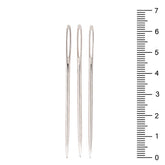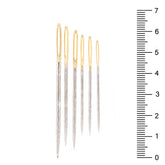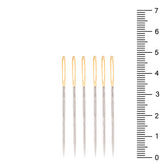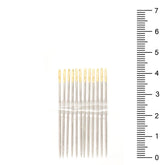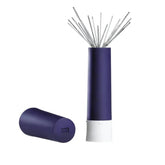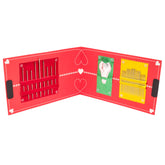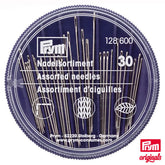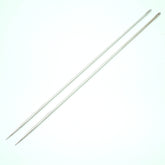-
Sewing needles assortment 30 pcsThis assortment of 30 sewing needles contains needles of different sizes and is packaged in a handy round package. Whether you need fine needles for delicate fabrics or thicker needles for heavier materials, this range has the right needle for your specific sewing project....
- €2,00
- €2,00
- Unit price
- per
-
Sewing needles with point and large eye 37mm 6 pcsThese hand sewing needles have a length of 37 mm and have a large (long) eye which makes it easier to feed the sewing thread. The needles come in a handy package. length 37mm 6 pieces with point
- €3,25
- €3,25
- Unit price
- per
-
Prym Embroidery Needles No. 3-9 125542These hardened steel sewing needles are perfect for fine embroidery and sewing work. With their tapered and slender point shape, and relatively large eye, these needles are easy to thread and offer excellent control and precision during sewing. The smooth, non-porous surface of the...
- €2,70
- €2,70
- Unit price
- per
-
Prym Embroidery Needles No. 5 - 125537Prym sewing needles with large eyes are perfect for fine embroidery and other sewing projects. These needles are burr-free and feature a finger-friendly head, making them comfortable to use. The smooth silver or gold-colored eye makes threading the yarn easy and protects it from...
- €3,00
- €3,00
- Unit price
- per
-
Hand Needles with Point 50mm 6 PiecesNeedles are tools used for sewing fabrics and materials. Needles come in various types and sizes, with or without a point, and their length can vary depending on the type of needle and its use. Needles without a point are used for sewing fabrics...
- €2,95
- €2,95
- Unit price
- per
-
Hand needles with point 33mm 6 piecesNeedles are tools used for sewing fabrics and materials. Needles come in different shapes and sizes, with or without a tip, and the length can vary depending on the type of needle and use. Needles without a point are used for sewing fabrics where...
- €2,95
- €2,95
- Unit price
- per
-
Sewing Needles with Point 60mm 6 PiecesNeedles are tools used for sewing fabrics and materials. Needles come in various types and sizes, with or without a point, and the length can vary depending on the type of needle and its use. Needles without a point are used for sewing fabrics...
- €2,95
- €2,95
- Unit price
- per
-
Prym Love Birdy Threader 611157The Prym Love Birdy threader is a handy tool for easily threading sewing needles. It is shaped like a little bird with a transparent beak, allowing you to effortlessly guide the thread through the needle's eye. This threader is designed to simplify the threading...
- €4,95
- €4,95
- Unit price
- per
-
Threader | Wilhelmientje | 5 piecesA threader is a handy tool used in sewing to easily pass thread through the eye of a needle. With a threader, threading the needle becomes much simpler, saving you time and frustration. It typically consists of a thin metal wire or loop with...
- €2,00
- €2,00
- Unit price
- per
-
Prym Sewing Needles 34mm No. 9The PRYM Long Sewing Needles, Size 9, measuring 0.60 x 34 mm, are essential tools for all your sewing work. These sewing needles are made from hardened steel and have a smoothly stamped eye without burrs. Thanks to their fine and slender ground point...
- €2,70
- €2,70
- Unit price
- per
-
Prym Assorted Needles 5-9, 20 PiecesPrym sewing needles, model 1121295, are an essential tool for all your sewing tasks. These longer and half-long sewing needles are made of hardened steel and feature a smooth, burr-free stamped eye. Thanks to their finely and slenderly ground point shape and the smooth,...
- €2,70
- €2,70
- Unit price
- per
-
Needles with Point | Cose | 3 pieces | No. 14Needles with a point are essential tools for all kinds of sewing and embroidery projects. These needles have a sharp point, allowing them to glide easily through various types of fabrics. Whether you are an experienced seamstress or an enthusiastic embroiderer, pointed needles offer...
- €2,50
- €2,50
- Unit price
- per
-
Needles with point | Cose | 6 pieces | No. 14/20Pointed needles are essential tools for all kinds of sewing and embroidery projects. These needles have a sharp point, which makes them easy to slide through different types of fabric. Whether you're an experienced seamstress or an avid embroiderer, pointed needles provide precision and...
- €2,50
- €2,50
- Unit price
- per
-
Needles with point | Cose | 6 pieces | no 18Pointed needles are essential tools for all kinds of sewing and embroidery projects. These needles have a sharp point, which makes them easy to slide through different types of fabric. Whether you're an experienced seamstress or an avid embroiderer, pointed needles provide precision and...
- €2,50
- €2,50
- Unit price
- per
-
Bead Needles 4 pcsVery thin bead needles. Supplied in a resealable package. Perfect for sewing beads onto clothing. The extremely thin design of these sewing needles allows them to fit perfectly through the opening of small beads. Length: 2x 48mm, 2x 54mm
- €3,95
- €3,95
- Unit price
- per
-
Needles with Point 40 mm | Cose | 16 pieces | No. 6Cose embroidery needles, specially designed for sewing enthusiasts and professionals. These needles are an essential tool for every embroidery project. Features: Length: 40 mm, perfect for a wide range of embroidery applications. Large Eye: Makes threading effortless, even for thicker or multiple threads, and...
- €2,95
- €2,95
- Unit price
- per
-
Needle twister | needle storage system | Prym 610291The Prym needle twister 610291 is an innovative and elegant storage device for your needles, with which you can not only keep your needles safely, but also sort and select them in an orderly manner. The design resembles a lipstick, making it a stylish...
- €7,50
- €7,50
- Unit price
- per
-
Sewing needles folder | set 29 | Prym Love 128161The Prym Sewing Needle Set 128 161 offers a wide selection of sewing needles that are perfect for various sewing and darning jobs. This set contains 29 sewing needles and darning needles in different sizes, as well as a handy needle threader. All needles...
- €4,95
- €4,95
- Unit price
- per
-
Sewing needles assortment 30 pieces | Prym 128600The Prym 128600 needle set is a complete and practical collection of 30 high-quality hand needles, ideal for various craft projects such as sewing, embroidery and darning. These needles are made of sturdy hardened steel and have a smooth, symmetrical eye, allowing them to...
- €4,30
- €4,30
- Unit price
- per
-
Matrasnaalden | 25 cm | 2 Stuks | Prym 131490Lange en stevige Prym matrasnaalden van 25 cm, ideaal voor stoffering, matrasreparaties en zware stoffen. Geleverd per 2 stuks.
- €10,95
- €10,95
- Unit price
- per
Looking for quality sewing needles for your sewing projects? At Fourniturenkraam.nl, you'll find an extensive collection of needles for every fabric and every use.
Easily Order Your Sewing Needles at Fourniturenkraam.nl
At Fourniturenkraam.nl, we understand the importance of the right needle for your sewing project. That's why we offer a diverse assortment, from fine sewing needles for delicate fabrics to sturdy leather needles for heavier materials. Each type of needle in our range has been carefully selected to meet the needs of both beginners and experienced sewers.
Hand Sewing Needles
- Traditional sewing needles for general use
- Special embroidery needles with a larger eye for easy threading
- Darning needles with blunt points, ideal for mending knitwear and crochet
Machine Needles
- Specifically designed for use in sewing machines
- Various sizes and types for different fabrics and techniques
Leather Needles
- Extra strong needles designed for working with leather and other thick materials
- Sharp chisel point ensures easy cutting of leather
Choose the Right Needle
Choosing the right needle is essential for the success of your project. Use thinner needles for fine fabrics and thicker needles for sturdy materials like leather. Also, ensure the needle is sharp to prevent fabric damage and guarantee a smooth sewing experience.
Frequently Asked Questions
How do I know which needle to use for my project?
- Choosing a selection results in a full page refresh.












